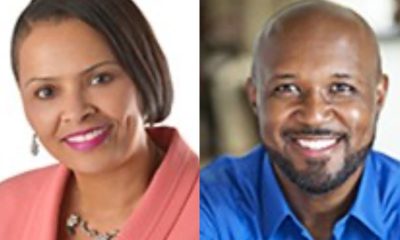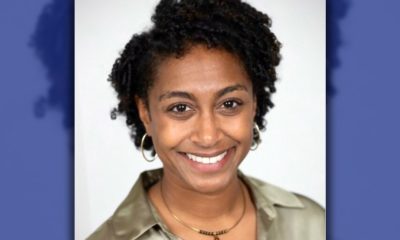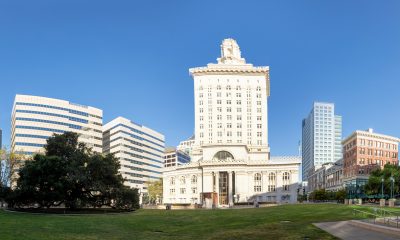Bay Area
Oakland NAACP Demands Investigation on Missed Deadline for Crime Fighting Funds from State
On Monday morning, community leaders including representatives from the Oakland NAACP chapter held a press conference at Acts Full Gospel Church to discuss their response to the city’s failure to meet the deadline for applying for state funding aimed at tackling organized retail crime.
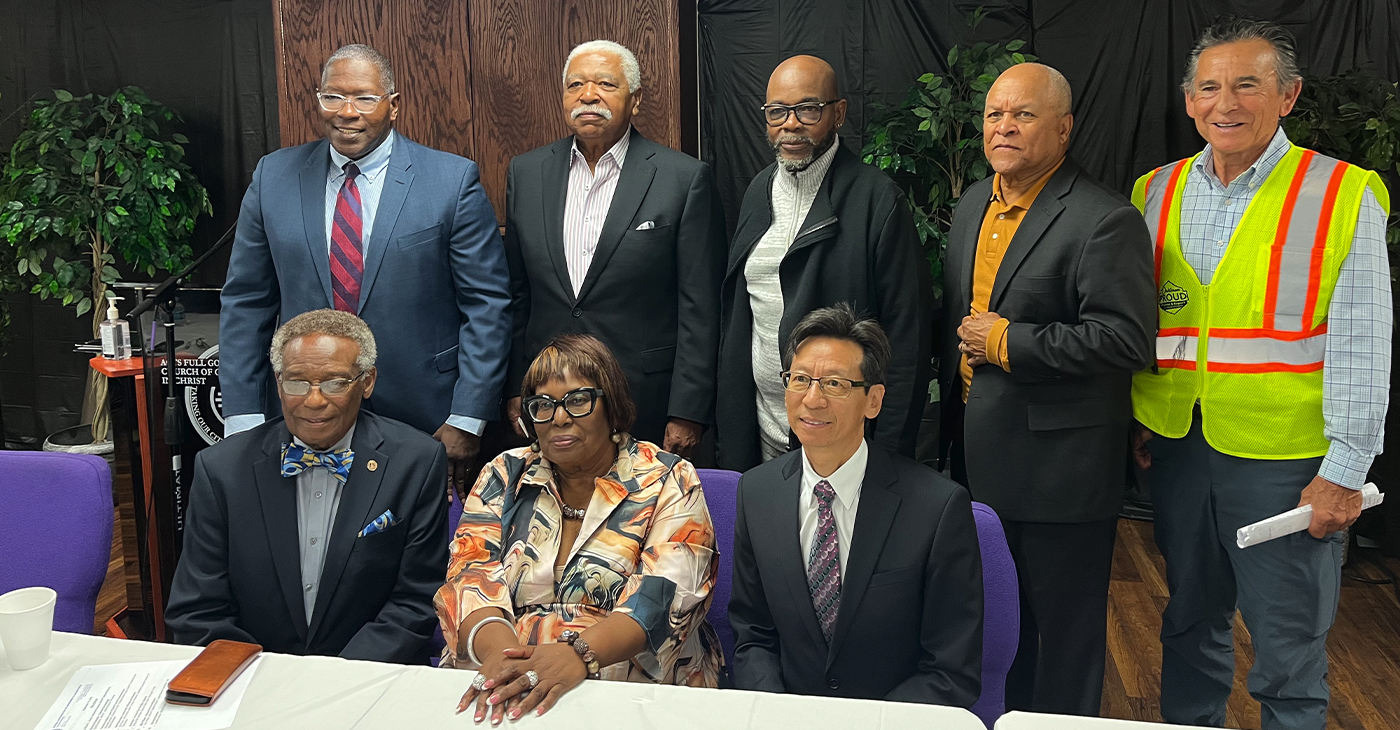
By Magaly Muñoz
Post Staff
On Monday morning, community leaders including representatives from the Oakland NAACP chapter held a press conference at Acts Full Gospel Church to discuss their response to the city’s failure to meet the deadline for applying for state funding aimed at tackling organized retail crime.
Last year Gov. Gavin Newsom signed Senate Bills 154 and 178 introduced by Sen. Nancy Skinner (D-Alameda) allocating a total of $267,118,293 to fight organized retail crime, the largest-ever single investment by the state.
On Sept. 14, the Board of State and Community Corrections (BSCC) awarded grants from the state budget to 55 local law enforcement agencies across California as part of the Governor’s Real Public Safety Plan. These grants, aimed at preventing, investigating, and prosecuting cases of organized retail theft, will be distributed among 34 police departments, 7 sheriff’s departments, one probation department, and 13 district attorney offices.
The application for the awards opened on April 14 and were due by July 7 at 5 p.m. (PST) through an online submission port.
In the Bay Area, law enforcement grants were awarded to San Francisco ($17.3 million), Fremont ($2.4 million), Newark ($986,444), Vacaville ($4.4 million), Santa Rosa ($560,653) and San Ramon ($5.6 million). In addition, $2 million in grants were awarded to the Alameda County District Attorney and San Francisco District Attorney.
Had Oakland made the application deadline, NAACP estimates that it could have received about $15 million for “extra police patrols, squad cars, and automated license plate readers to track down suspected perpetrators of crime.”
Participating on the press conference panel from the Oakland NAACP branch were Robert L. Harris, general counsel; Cynthia Adams, chapter president; Greg McConnell, lifetime member; Terry Whiley, legal redress committee chair; and representing the community was Carl Chan, former president of Oakland Chinatown Chamber of Commerce; Bishop Bob Jackson, senior pastor at Acts Full Gospel Church; and Noel Gallo, Oakland city councilmember.
The panel said they don’t fully believe that the city accidentally missed the grant deadline, but just didn’t care to complete the application for unknown reasons that should be shared with the community. This has prompted the NAACP to ask for an independent investigation by the city auditor.
“Why wasn’t the application for a $15 million grant to fight retail theft not given the highest priority by the city administrator’s office?” Terry Wiley, a former district attorney with Alameda County, calling for an investigation.
Along with calling for an investigation, the NAACP announced a 10-point plan that they believe will create a safer environment in Oakland.
The points include ensuring 911 centers are fully staffed, installing surveillance cameras and license plate readers, implementing community policing strategies, and increasing the staff of the Oakland PD to 1,000 officers. The plan also proposes rehiring of former police chief LeRonne Armstrong, who was dismissed in February by Mayor Sheng Thao over allegations of mishandling officer misconduct cases.
Chan told the audience that the city’s ongoing crime spree has prompted business closures, as workers and community feel unsafe, deterring them from supporting local businesses.
“It’s pretty sad to see that many businesses are suffering, along with people, whether they’re driving down on the street, carjacking or home invasion,” Chan said. “Many of our seniors are afraid of walking down our own streets, and it’s not right, it’s not fair.”
Because of these business closures, Chan announced plans for a one-day strike by Oakland’s small businesses to signal to the city that “enough is enough” and more action is needed against retail crime.
The panel also shared that Mayor Thao has repeatedly declined to meet with the NAACP Oakland chapter to discuss their concerns and proposed plans to combat the crimes in the city.
ABC7 reported that in a press conference at Oakland Airport on Monday, the mayor said she thinks it’s “utter BS” and “not true at all” that the city did not want to apply for the grant. She said that the city will be receiving 300 surveillance cameras from the governor’s office and are looking to start launching large drones to track down perpetrators, awaiting the FAA’s approval.
Adams concluded the press conference by demanding a statement and an apology from the mayor for neglecting to apply for a state grant that could have benefited the Oakland community.
“What is going on in Oakland is a civil rights issue,” Adams said. “The buck stops with the mayor. This is the mayor’s fault. We need to hear a statement, we need to hear an apology from the mayor for what she did to the citizens of Oakland.”
Activism
In 1974, Then-Gov. Jimmy Carter Visited the Home of Oakland Black Black Political Activist Virtual Murrell While Running for President
civil rights icon Georgia State Representative Julian Bond said that Carter, along with governors Reuben Askew of Florida, Dale Bumpers of Arkansas, and Terry Sanford of North Carolina, were all a part of what was being dubbed the “New South” and so supported civil rights and voting rights for African Americans.

By Virtual T. Murrell
Special to The Post
On his way to seeking the presidency, then-Gov. Jimmy Carter visited the Bay Area in his capacity as campaign chairman of the Democratic National Committee in March of 1974.
A friend of mine, Bill Lynch, a Democrat from San Francisco, had been asked to host Carter, who was then relatively unknown. Seeking my advice on the matter, I immediately called my friend, civil rights icon Georgia State Representative Julian Bond, for his opinion.
Bond said that Carter, along with governors Reuben Askew of Florida, Dale Bumpers of Arkansas, and Terry Sanford of North Carolina, were all a part of what was being dubbed the “New South” and so supported civil rights and voting rights for African Americans.
Based on Julian’s comments, I agreed to host the governor. We picked him up at the San Francisco Airport. With his toothy smile, I could tell almost right away that he was like no other politician I had ever met. On his arrival, there was a message telling him to go to the VIP room, where he met then-Secretary of State Jerry Brown.
After leaving the airport, we went to a reception in his honor at the home of Paul “Red” Fay, who had served as the acting secretary of the Navy under President John Kennedy. (Carter, it turned out, had been himself a 1946 graduate of the U.S. Naval Academy and served as a submariner in the 1950s.)
The following afternoon, the Niagara Movement Democratic Club hosted a reception for Carter, which was a major success. Carter indicated that he would be considering running for president and hoped for our support if he did so.
As the event was winding down, I witnessed the most amazing moment: Carter’s wife, Rosalynn, was in the kitchen with my former wife, Irene, wearing an apron and busting suds! You would have to have been there to see it: The first and last time a white woman cleaned up my kitchen.
A few months later, President Richard Nixon resigned amid the Watergate scandal. He was succeeded by his vice president, Gerald Ford.
On the heels of that scandal, Jimmy Carter’s election in 1976 represented integrity and honesty at a point in America’s history when he was just what the nation needed to lead as president of the United States.
Activism
Oakland Post: Week of January 1 – 7, 2025
The printed Weekly Edition of the Oakland Post: Week of January 1 – 7, 2025

To enlarge your view of this issue, use the slider, magnifying glass icon or full page icon in the lower right corner of the browser window.
Activism
Let’s Talk Health: Empowering Our Community with Health Literacy
At Covered California, we recognize that understanding health insurance is more than just choosing a plan –it’s about having the knowledge to make informed decisions that lead to healthier lives. That’s why this year’s open enrollment campaign, “Let’s Talk Health,” focuses on breaking down barriers and simplifying the complex language of health care.
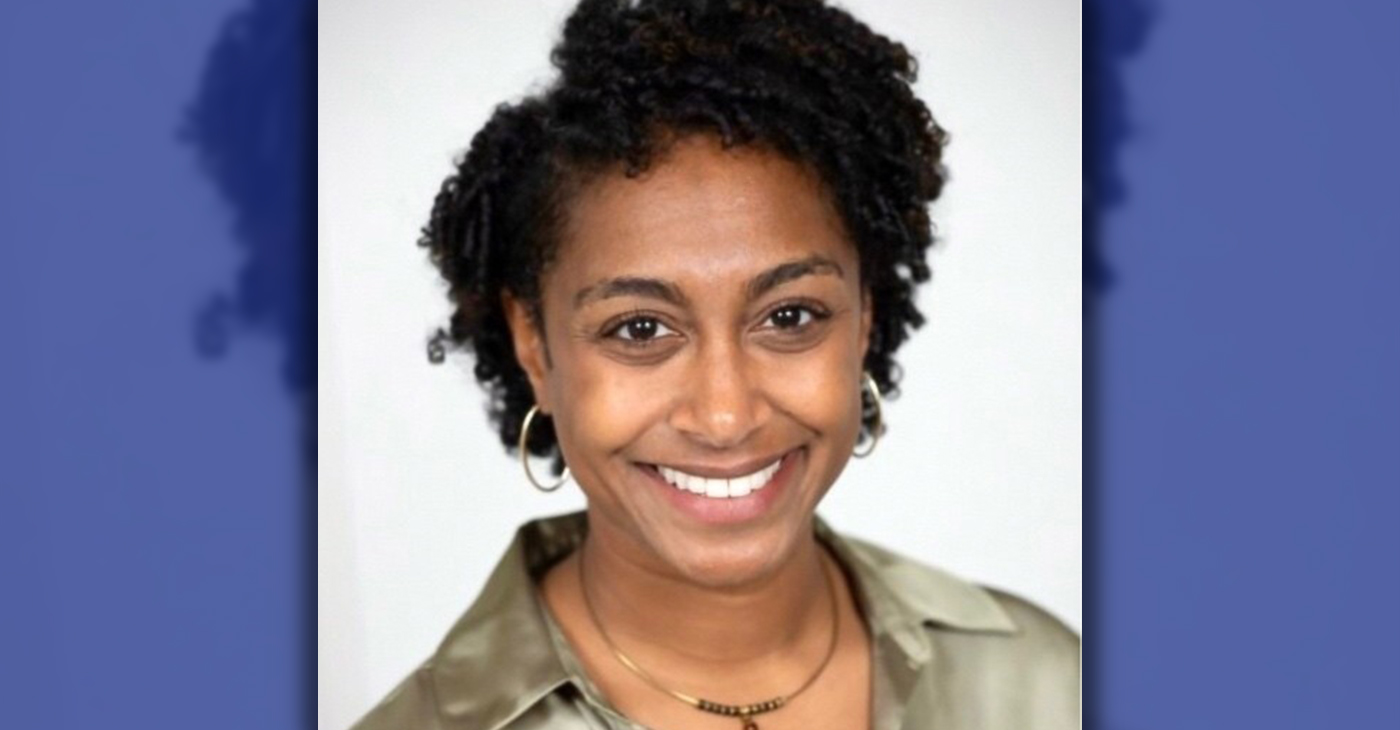
By Dr. Monica Soni
Navigating health insurance can often feel overwhelming, especially for individuals and families who are new to the system or unsure about their options.
At Covered California, we recognize that understanding health insurance is more than just choosing a plan –it’s about having the knowledge to make informed decisions that lead to healthier lives. That’s why this year’s open enrollment campaign, “Let’s Talk Health,” focuses on breaking down barriers and simplifying the complex language of health care.
Health literacy is critical for achieving better outcomes, reducing disparities, and ensuring every African American and Black Californian — regardless of their income, ethnicity, or background — has access to quality care. By making health insurance simpler to understand, we empower individuals to access preventive services, manage chronic conditions, and avoid costly medical bills.
Breaking Barriers in African American and Black Communities
This year, “Let’s Talk Health” places a special focus on supporting African American and Black communities, where systemic inequities in health outcomes persist. These communities often face higher rates of chronic conditions and challenges in navigating the health care system. To address these disparities, Covered California partnered with trusted organizations to provide information, tips and resources.
In San Francisco, Andre Atkins, Director of Programs at Rafiki Coalition, led a dialogue with Dr. Kim Rhoads, Community Engagement Director at UCSF Helen Diller Family Comprehensive Cancer Center; Destiny Williams, Health and Wellness Program Manager at Rafiki Coalition; and myself.
These conversations play a vital role in the pursuit of health equity by sharing power and creating spaces where our community can learn, share experiences, ask questions and connect with advocates who work daily to understand their unique needs. Through these efforts, we reaffirm our dedication to fostering equity and inclusion in health care, ensuring that every voice is heard and supported.
Why Health Literacy Matters
Health literacy goes beyond understanding health care terms. It’s about empowerment. It equips individuals to make informed decisions, from choosing the right health plan to finding a provider to deliver preventive care and seeking mental health services. At Covered California, we provide tools and resources, such as side-by-side plan comparisons and financial assistance details, to ensure everyone can navigate their options confidently and access the care they need.
Taking the First Step
Whether you’re a student, part-time worker, family of four, open enrollment is your opportunity to prioritize your health and your future. This year’s open enrollment period runs from Nov. 1, 2024, to Jan. 31, 2025, and we’re here to assist you every step of the way.
Consumers must select a health plan by the Dec. 31 to receive coverage for the entire year, starting Jan. 1, 2025.
To find the plan that’s right for you, and take the first step toward a healthier tomorrow, visit CoveredCA.com and fill out the application yourself or put in your ZIP code and connect with a certified agent in your neighborhood who can guide you through your options. Together, we can break down barriers and ensure that all Californians have the tools to thrive.
Dr. Monica Soni, MD, is the Chief Medical Officer for Covered California, where she leads efforts in health equity, quality transformation, and clinical innovation. As a practicing board-certified internal medicine physician and health care leader with over a decade of experience, Dr. Soni is committed to improving affordability, access, and outcomes for all Californians.
-

 Activism2 weeks ago
Activism2 weeks agoBooks for Ghana
-

 Activism4 weeks ago
Activism4 weeks agoPost News Group to Host Second Town Hall on Racism, Hate Crimes
-

 Arts and Culture3 weeks ago
Arts and Culture3 weeks agoPromise Marks Performs Songs of Etta James in One-Woman Show, “A Sunday Kind of Love” at the Black Repertory Theater in Berkeley
-

 Activism4 weeks ago
Activism4 weeks agoButler, Lee Celebrate Passage of Bill to Honor Congresswoman Shirley Chisholm with Congressional Gold Medal
-

 Activism3 weeks ago
Activism3 weeks ago‘Donald Trump Is Not a God:’ Rep. Bennie Thompson Blasts Trump’s Call to Jail Him
-

 Activism4 weeks ago
Activism4 weeks agoDelta Sigma Theta Alumnae Chapters Host World AIDS Day Event
-

 Business4 weeks ago
Business4 weeks agoLandlords Are Using AI to Raise Rents — And California Cities Are Leading the Pushback
-

 Activism3 weeks ago
Activism3 weeks agoOakland Post: Week of December 11 – 17, 2024


